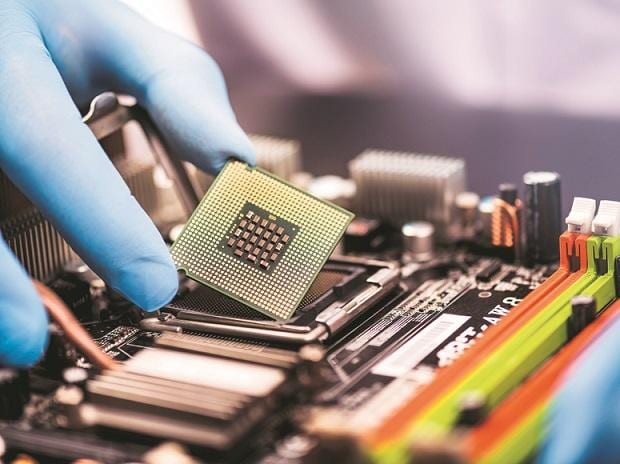Foxconn walks out of Vedanta joint venture for chip plant in India
In what could be a blow to India’s chipmaking ambitions, Taiwanese major Foxconn has pulled out of its joint venture with Anil Agarwal’s Vedanta Group nearly a year after signing an agreement to build a 1.54 trillion rupees facility in Gujarat. Following a memorandum of understanding with the Gujarat government last September, the joint venture announced earlier this year that it will set up a semiconductor manufacturing and display facility in the Dholera Special Investment Zone, near Ahmedabad. This would have been India’s first semiconductor plant.
The manufacturing of semiconductors — the basic components used in electronic devices for anything from communications to healthcare and transportation to military systems — has come into the spotlight in the midst of a technology war between the United States and China. While more than 90 percent of the most advanced semiconductors are made in Taiwan, other countries that make chips include South Korea, Japan, the United States, and China.
Taiwanese major Foxconn, the world’s largest chip maker, said in a statement on Monday that it had decided not to proceed with the joint venture with Vedanta. “Foxconn is removing the Foxconn name from now on which is a wholly owned entity of Vedanta.” Before Gujarat, Maharashtra was scouted as a destination for Foxconn’s chip manufacturing plant.
Mining giant Vedanta Group, which has been in the news due to the financial strains of its London-based entity Vedanta Resources, was quick to respond and reassure investors that nothing was amiss. “Vedanta reiterates its full commitment to the semiconductor project and we have lined up with other partners to set up the foundry,” the company said. It added that Vedanta has a license to produce 40nm-class chips from a prominent integrated device maker. He noted that “it will soon obtain a license to produce 28 nanometers as well.”
Communications Minister Ashwani Vaishnau, who was present in Gandhinagar at the time of the signing of the MoU last September, did not express his disappointment over the severance of Foxconn-Vedanta JV. “Both companies have been committed to India’s semiconductor story, so India’s chip story will not be affected,” Vaishinau said. The Minister of State for Electronics and Information Technology, Rajiv Chandrasekhar, tweeted that Foxconn’s decision would not have any impact on the semiconductor manufacturing plant target in India. “Nothing,” the minister repeated.
Sources tracking the development said Foxconn could come on its own – a suggestion the Taiwanese flagship discussed with top government officials recently. The reference was to a previous statement by Foxconn Global Chairman and CEO Young Liu that the company would like to set up a second fab factory with or without a government incentive.
However, the latest development is seen by analysts as a political setback for both the center and the Gujarat government. Prime Minister Narendra Modi highlighted the importance of the massive semiconductor plant being built by Foxconn and Vedanta at a rally in Bhavnagar ahead of the Gujarat assembly elections. Relying on the semiconductor plant, Chief Minister of Gujarat Bhubindrabhai Patel promised to create “100,000 jobs”. In fact, Gujarat became the first state to adopt a semiconductor policy last year.
Foxconn-Vedanta was one of the first three players to apply this past January to be eligible under the semiconductor status scheme. 50 percent of the project cost was offered in advance.
According to people familiar with the matter, Foxconn, which consumes $40 billion worth of chips annually and is now getting into electric vehicles, has agreed to buy back a significant portion of the 28nm product under the joint venture.
The project went through many twists and turns. The joint venture decided to modify its previous proposal – just a few weeks ago – by including 40nm chip manufacturing – where the technology is readily available…. Back and forth on technology negotiations also put things on hold. Senior sources said that apart from technical challenges, the project was also delayed due to the financial pressure of the Vedanta Group to reduce its soaring debt. They note that there is a growing sense that the Taiwanese company isn’t bringing much to the table — except for some potential chip buybacks.
While Vedanta looks bullish, none of the three projects have received clearance from India Semicondcutor Mission – the nodal body. Singapore-based IGSS and Dubai-based ISMC, which had a relationship with Tower Corporation for a $3 billion technology project, were asked to come up with new proposals that they could do. Intel has acquired the tower, but is still awaiting regulatory clearances.
There is something to cheer about, too, in the story of the chips. India managed to tie the knot with Micron, which agreed to invest $285 million in a chip testing and packaging plant with chips imported from its off-the-shelf plants in other countries. Talks have also begun about the possibility of setting up a Fab memory chip factory.
